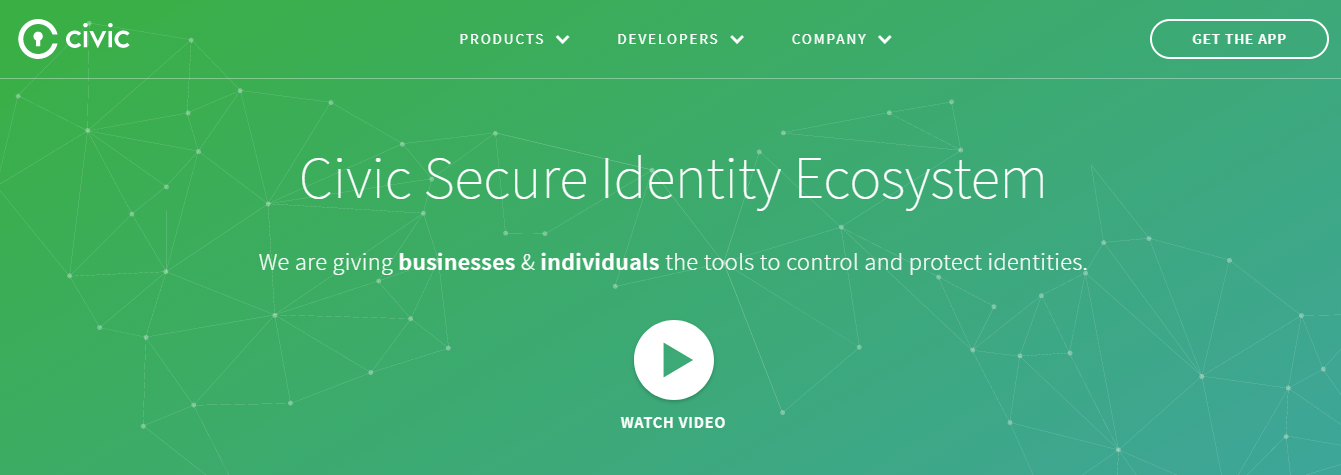Studies have shown that over 15.4 million individuals in the United States alone faced issues related to identity fraud and theft in 2016. Not only that, in the same year it was reported that 1.1 billion digital identities of internet users across the globe were stolen by hackers.
Civic is an all-new blockchain-based identity verification (IDV) platform that provides users with on-demand, secure and low-cost access to digital privacy services. Through its unique system, Civic is able to eliminate the need for recurring background and personal information verification checks that are undertaken every time a new institution requires such a protocol to be initiated.
In terms of its functionality, Civic’s decentralized ecosystem requires users to employ native tokens to facilitate all transactions pertaining to IDV services.
The platform’s customers will be able to use their digital devices (smartphones, tablets, etc.) for streamlined identity verification checks. These devices will contain individuals’ personal information, such as their names or passport numbers, so that they can easily identify themselves at:
- Airport check-in counters
- Security checkpoints
- Hotels
Overview of Civic
- Features an interface that is easy to use and operate
- Makes use of biometric information associated with an individual, making the authentication process more secure and safe
- Provides customers with identity-theft insurance in excess of one million dollars
- Uses native CVC tokens to facilitate internal transactions (340,100,000 currently in circulation)
Key Features
To start things off, Civic offers users a Secure Identity Platform (SIP) which uses blockchain technology to make user identities verifiable, decentralized, and secure. Additionally, Civic’s SIP module uses verified identities for multi-factor authentication without the need for specifics such as usernames or passwords.

Overview of the Civic ecosystem
Unlike many other blockchain-based identity platforms, Civic offers a fully functional IDV service that is already being implemented within diverse domains such as:
- Finance
- E-commerce and cryptocurrency
- Medicine and healthcare
- Social identity verification
Another key facet of this platform is that customers can use Civic’s Secure Private Login (SPL) to create new accounts without the need for a username or password. However, it should be noted that unlike Facebook’s native login service, Civic ensures that each new user undergoes a series of identity checks before they can sign up for the platform.
Other important features worth noting include:
(i) Identity Theft Insurance — a highly underrated aspect of Civic is that it provides users with protection from identity theft by monitoring external threats in real time. It does so by issuing pertinent alerts as well as by offering customers up to $1 million in theft insurance.
(ii) Rewards — using CVC tokens as incentives, Civic provides identity validators as well as provers with handsome rewards for sharing information with one another.
How it works
Firstly, Civic users need to download the company’s smartphone app on their mobile device of choice. Customers are then asked to prove their identities as part of the account creation process. This might take some time, as certain documents need to be provided in order to gain access to Civic’s Secure Identity Platform (SIP).

Visual representation of how the platform works
Once users have gained access to the core operational module, Civic’s native ID protocol or a trusted third-party Identity Partner (such as a government entity, bank, or utility company) receives the user’s encrypted Personal Identifying Information (PII).
Through the blockchain, Civic then sends an attestation to prove that all internal data being transmitted within the system is verifiable and secure. After enough validators have approved a given request, the Identity Requester is duly sent a notification in regard to the matter.
Lastly, a final check is performed by Civic using a broad range of public records, such as a person’s:
- Social media accounts
- Contact information
- Credit checks
Civic also makes use of a host of advanced fraud detection algorithms that help in manually auditing network requests while rejecting fraudulent ones at a high success rate.
About the project
Civic is backed by Vinny Lingham, a South African entrepreneur who has been a part of many successful business ventures in the past including the online retail company Gyft.
The CTO of this project is Jonathan Smith. According to his LinkedIn profile, Jonathan has been in the banking and tech sectors for more than a decade and has previously been associated with many successful blockchain-based startups.
The company also has on its roster around 50 full-time employees, based in various locations across the globe.
Token Performance Data

CVC token lifetime performance data (courtesy of CoinMarketCap)
While initially priced at just $0.18 per token, CVC quickly gained traction within the global crypto market and reached a peak value of around $1.32 in January of this year.
However, since its meteoric rise, the price of the currency has gone down, and as of April 21, the value of a single CVC token stands at $0.378.
Final Thoughts
With Civic providing its customer base with a fully developed decentralized identity platform that is not only secure but cost-effective, it will be interesting to see how CVC tokens are received by the global crypto community at large by the end of this year.
Since Civic is a highly potent alternative to many of the mainstream identity verification systems in the market today, it would not be surprising to see this technology fare well in the coming months.
If you would like to start investing in Civic, CVC trading pairs are currently available on websites such as Huboi, Upbit, Bittrex, and OKEX.

